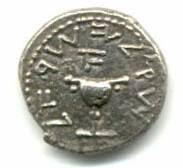Yet another interesting and possibly timeline shattering artifacts uncovered in Israel.
The Detroit Free Press: Ancient letters reveal Bible bombshell
(NEWSER) — "A full homer of wine, bring tomorrow; don't be late." That command, written on pottery excavated near the Dead Sea, not only shows soldiers liked to drink in the Kingdom of Judah around 600BC. It might also push back the date of the Old Testament.In analyzing 16 letters on pottery found at a fort in Arad, Israel, researchers at Tel Aviv University identified six authors, including the fort commander and a low-ranking quartermaster of the Judahite army. "And they wrote well, with hardly any mistakes," study author Israel Finkelstein tells the New York Times. This suggests literacy was widespread with perhaps hundreds of literate people in Judah at the time, which "is really quite amazing," Finkelstein tells Live Science.
Experts have long believed there wasn't enough literacy for the majority of biblical texts to be inscribed before 586BC when Judah's capital of Jerusalem was destroyed and elites were exiled to Babylon.
In other words, these texts show parts of the Old Testament — including the Books of Isaiah, Amos, and Hosea, and parts of Genesis and Deuteronomy—could have been written earlier than previously thought.
"Several (biblical) texts refer to events which best fit the reality in the years just before the fall of the Kingdom of Judah," Finkelstein says, per Discovery News. "There must have been some sort of educational system in Judah at that time." Because all forms of writing vanish after the destruction of Jerusalem and only re-emerge hundreds of years later around 200BC, he concludes "the first Judahite biblical texts were most probably put in writing in Jerusalem by priests and officials in the entourage of the king, possibly King Josiah."
Certainly literacy has been an important value for Jews for millennia, and to find writings from the non-priestly class including not just a commander of a fort but a quartermaster in 600 BC is an interesting discovery. If it revises scholar's timelines as to when the Bible might have been written, and their understanding of the people during that period makes it quite an important discovery.

3 comments:
It definately changes the view of the level of literacy in earlier eras.
One of these days I'm going to renew my "Biblical Archaeology Review" subscription...
It definately changes the view of the level of literacy in earlier eras.
One of these days I'm going to renew my "Biblical Archaeology Review" subscription...
Those writings document the Jewish people's claim to the Land of Israel.
Post a Comment